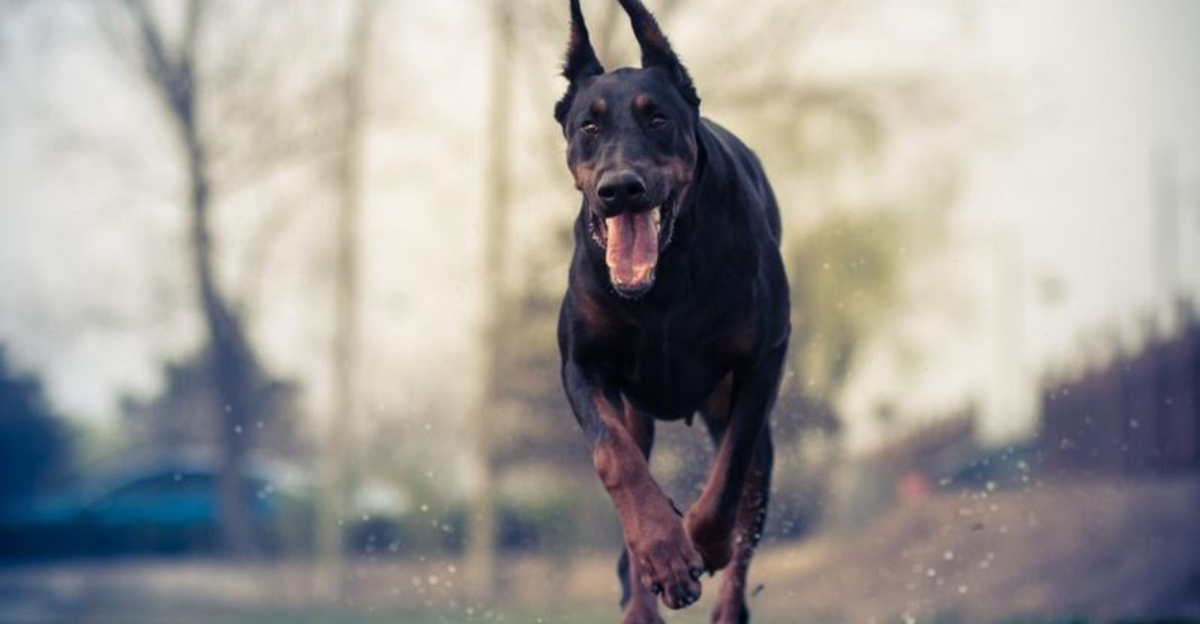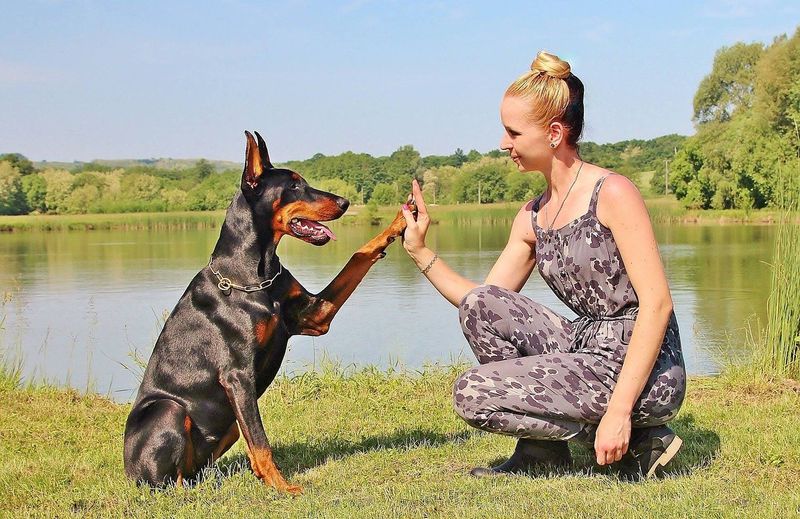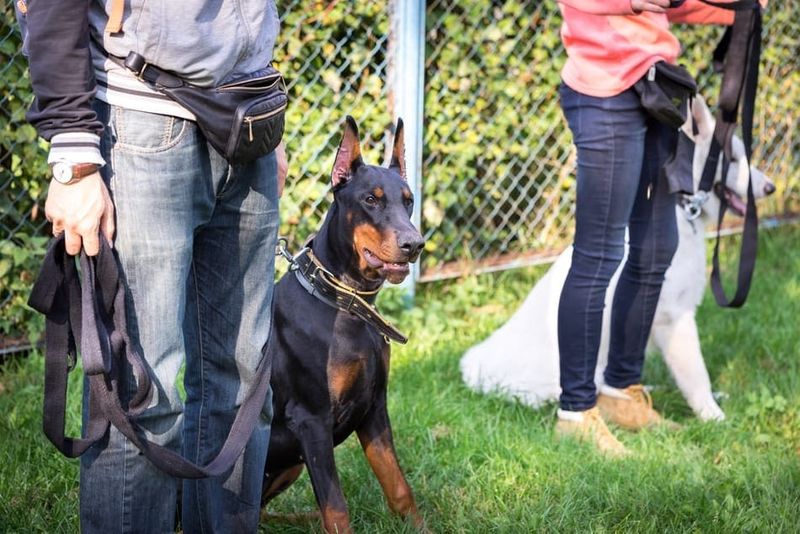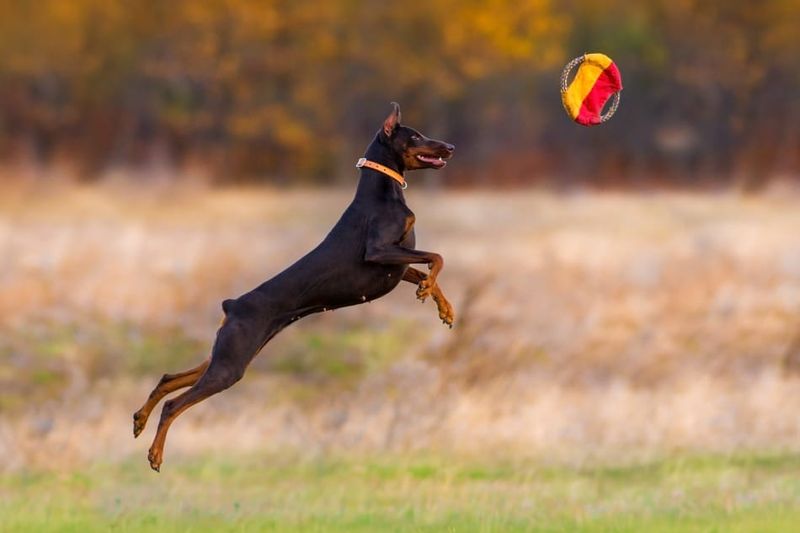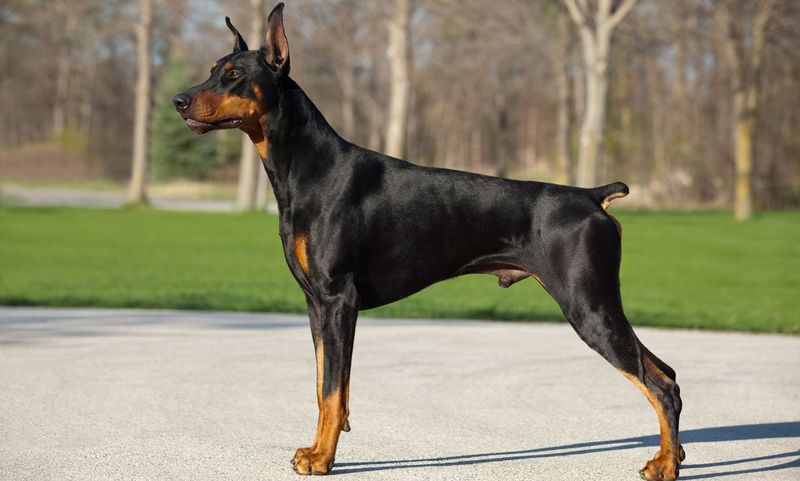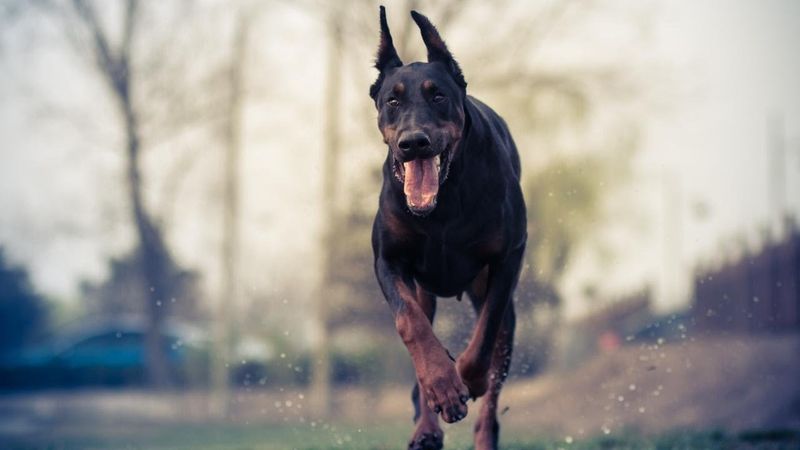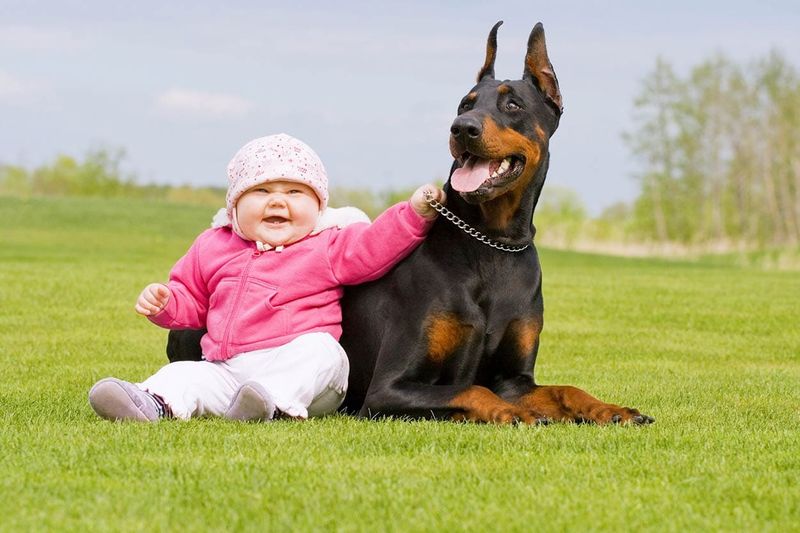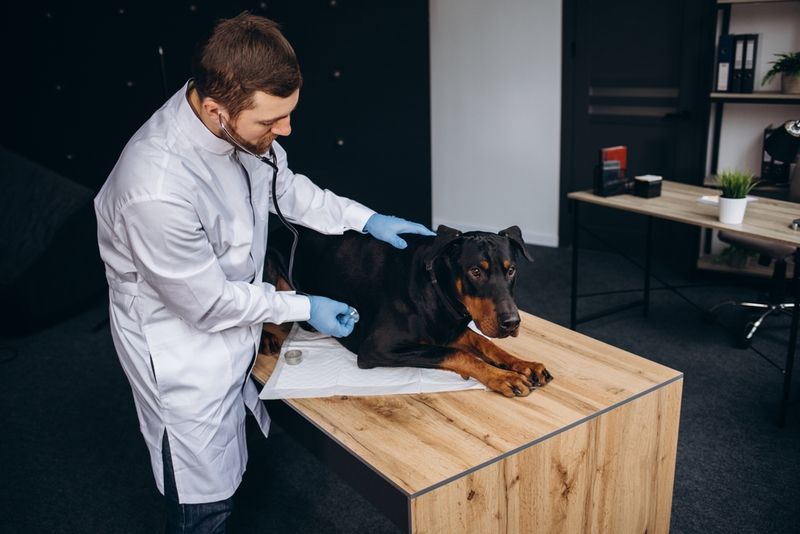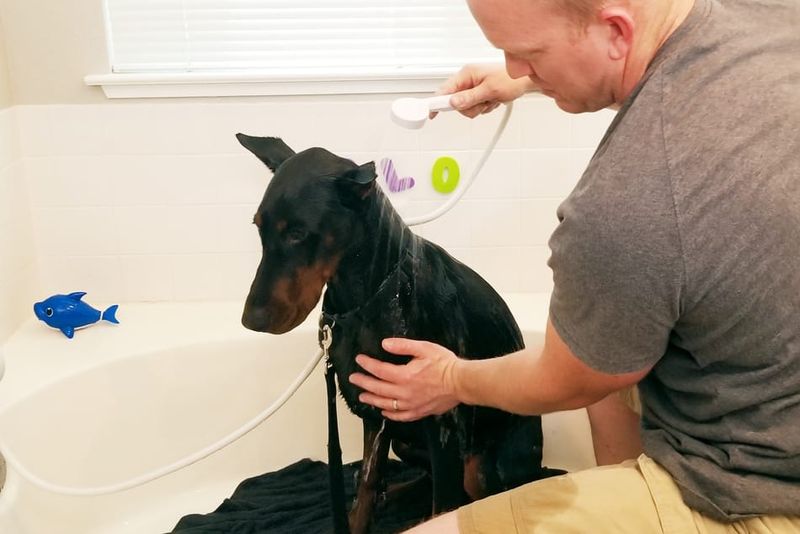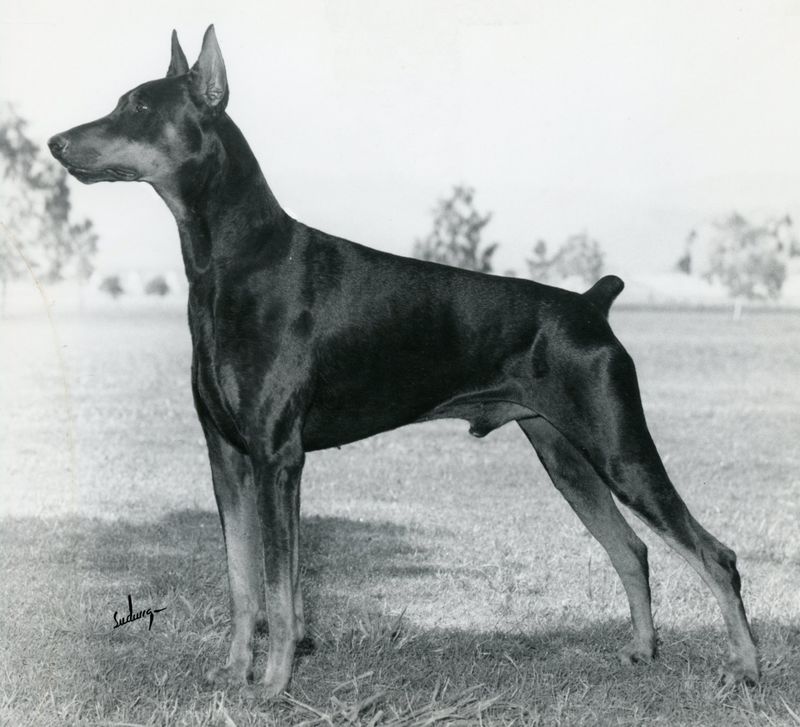Doberman Pinschers are known for their sleek physique and commanding presence. However, this breed offers a mix of advantages and challenges that any potential owner should consider. Here’s an in-depth look at 19 pros and cons of owning a Doberman to help you make an informed decision.
Loyal Companionship
With unyielding loyalty, Dobermans form an intense bond with their family. This breed thrives on companionship and will often act as a shadow, following you from room to room. Such loyalty means they are always eager to please and protect their loved ones.
For those seeking a devoted friend, a Doberman offers unparalleled companionship, ensuring that you never feel alone. Their protective nature makes them excellent watchdogs, always alert to any potential threats.
However, this bond requires time and attention, as Dobermans can suffer from separation anxiety if left alone too long.
Intelligence and Trainability
Dobermans are incredibly intelligent and quick learners. They excel in obedience training and can master new commands faster than many other breeds. This intelligence, combined with their eagerness to please, makes them highly trainable for various activities.
Whether it’s agility, obedience, or protection work, a Doberman can excel. Their sharp mind requires regular mental stimulation to keep them engaged and happy.
However, their intelligence means they can also be a bit stubborn, requiring consistent and firm training techniques to ensure they remain well-behaved.
Energetic Exercise Needs
For those who love outdoor activities, Dobermans make excellent companions. Their high energy levels mean they require plenty of exercise to stay healthy and happy. Daily walks, runs, or play sessions are essential to meet their exercise needs.
This breed thrives in active households where they can participate in various activities. Their athletic build makes them perfect for agility training and other dog sports.
However, without sufficient exercise, they can become bored and develop destructive behaviors, making them unsuitable for sedentary owners.
Sleek Aesthetic Appeal
Dobermans are often admired for their elegant and sleek appearance. Their muscular build, shiny coat, and graceful stance give them a majestic look that’s hard to ignore. This aesthetic appeal is one of the reasons many people are drawn to this breed.
Their appearance alone can be intimidating, serving as a deterrent to potential intruders. Despite their tough exterior, they are known for their affectionate nature towards their family.
However, maintaining their sleek appearance requires regular grooming and skincare, especially since their short coat doesn’t hide imperfections easily.
Protective Nature
With a natural protective instinct, Dobermans are often regarded as excellent guard dogs. Their vigilant nature ensures they are always on the lookout for any unusual activity around their home. This breed’s protective traits make them reliable guardians for families.
Their imposing presence can deter potential threats, offering peace of mind to their owners. While their protection is a pro, it also requires responsible ownership to ensure they are properly socialized.
Poor training can lead to overprotectiveness, making early socialization crucial to balance their instinct with appropriate behavior.
Socialization Requirements
Dobermans have specific socialization needs to thrive as well-rounded pets. Early exposure to different environments, people, and animals is crucial for developing their social skills. A well-socialized Doberman is more likely to be friendly and approachable.
Socialization helps curb their natural wariness of strangers and reduces the risk of aggressive tendencies. This process should begin as early as possible and continue throughout their life.
However, neglecting socialization can lead to a shy or reactive dog, highlighting the importance of consistent and positive interactions.
Short Coat Maintenance
The short coat of a Doberman is both a blessing and a challenge. While it requires less grooming than long-haired breeds, regular brushing is still necessary to keep it looking sleek. Their coat sheds moderately, making it relatively easy to manage.
Regular grooming sessions help distribute natural oils, contributing to a healthy shine. Despite their low grooming needs, skin care should not be neglected, as their coat doesn’t provide much protection.
Dobermans are sensitive to extreme weather conditions due to their short coat, requiring proper care during hot or cold spells.
Affectionate Family Dog
Despite their fierce reputation, Dobermans are known for their affectionate nature towards their families. They form strong bonds with family members, including children, and often seek out cuddles and companionship.
This loving demeanor makes them excellent family dogs, as they enjoy being part of the household activities. Their ability to adapt to family life is one of their most endearing qualities.
However, their need for closeness means they don’t do well in homes where they are left alone for extended periods, requiring a family that can provide attention and interaction.
Health Considerations
Dobermans, like all breeds, have certain health considerations that potential owners should be aware of. Common issues include hip dysplasia, heart conditions, and certain genetic disorders. Regular veterinary check-ups are essential to catch any health problems early.
Proper diet and exercise can help maintain their overall health and well-being. Understanding their health needs can prevent costly medical bills and ensure a long, healthy life.
Additionally, responsible breeding practices can mitigate some health risks, making it important to choose reputable breeders when selecting a Doberman puppy.
Living Space Adaptability
Dobermans are surprisingly adaptable when it comes to living spaces. While they thrive in homes with yards, they can adjust to apartment living if their exercise needs are met. Their moderate size makes them suitable for a variety of living arrangements.
Providing them with enough physical and mental stimulation is key to preventing boredom in smaller spaces. Their adaptable nature makes them a versatile breed for different types of homes.
However, their need for activity means they are better suited to owners who can commit to regular outings and playtime.
Vocal Communication
Dobermans are known to be vocal, using their barks and sounds to communicate with their owners. They can be quite expressive, alerting you to any unusual activity or simply seeking attention.
Their vocal nature makes them effective watchdogs, as they are quick to signal when something is amiss. Understanding their barks can help owners respond appropriately to different situations.
While their communication is a beneficial trait, it can also be a nuisance if not managed properly, requiring training to ensure they don’t become overly noisy.
Weather Sensitivity
Dobermans have a sensitivity to extreme weather due to their short coat and lean build. This makes them more susceptible to cold temperatures and overheating in the sun. Owners should take precautions to protect them during harsh weather.
Providing appropriate clothing, like dog coats in winter, can help keep them comfortable during colder months. Ensuring they stay hydrated and cool during hot weather is equally important.
Their weather sensitivity requires thoughtful care and preparation, especially for those living in areas with significant temperature fluctuations.
Unique Personality Traits
Each Doberman has its own unique personality, making them interesting and engaging companions. They can be playful, serious, or a mix of both, depending on the situation. This breed’s personality is often a reflection of its upbringing and training.
Their unique traits make them endearing to owners, as they display a wide range of emotions and behaviors. Understanding and nurturing their personality quirks can lead to a fulfilling relationship.
Despite their varied personalities, consistency in training and interaction helps develop a well-rounded Doberman.
Travel-Friendly Size
Dobermans are a great size for families who love to travel with their pets. Their moderate build allows them to fit comfortably in most vehicles, making road trips more enjoyable for everyone.
Traveling with a Doberman is manageable, provided they are accustomed to car rides and new environments. Their adaptability and love for companionship make them excellent travel buddies.
Ensuring they have regular breaks and are comfortable during journeys is important. With proper preparation, a Doberman can explore new places with you, enhancing your adventures together.
Grooming Ease
One of the advantages of owning a Doberman is their low grooming needs. Their short coat requires minimal maintenance, making them suitable for those who prefer a low-fuss grooming routine.
Regular baths and brushing are enough to keep their coat healthy and shiny. This ease of grooming is a time-saver for busy owners who still want a well-groomed pet.
Despite their low grooming demands, regular checks for skin issues are recommended, as their coat provides minimal protection. Overall, Dobermans are a good choice for those seeking a pet with manageable grooming needs.
Separation Anxiety
Dobermans are known for their strong attachment to their families, which can lead to separation anxiety when left alone. This anxiety manifests in behaviors such as barking, destructive chewing, or attempting to escape.
Owners should be mindful of gradually accustoming their Doberman to being alone for short periods. Providing toys and mental stimulation can help alleviate their anxiety.
For those who spend a lot of time away from home, this breed may require additional attention and training to prevent anxiety-related behaviors from developing.
Strong Prey Drive
Dobermans possess a strong prey drive, a trait that can be both a challenge and an advantage. This instinct means they are often alert and responsive to their surroundings, making them excellent for activities like tracking.
However, their prey drive requires careful management, especially around smaller animals. Training and supervision are essential to ensure they don’t chase or harm other pets or wildlife.
Understanding their instinctual behavior helps in providing appropriate outlets for their energy, keeping them engaged and well-behaved.
Lifespan and Longevity
Dobermans generally have a lifespan of 10 to 13 years, which is typical for dogs of their size. Their longevity is influenced by genetics, diet, exercise, and healthcare.
Providing a balanced lifestyle and regular veterinary care can contribute to a longer, healthier life. Owners should be prepared for the needs of an aging Doberman, including potential health issues common in seniors.
The bond formed over the years with a Doberman can be deeply rewarding, making each moment spent with this loyal breed worthwhile.
Historical Significance
Originating in Germany, the Doberman Pinscher was developed by a tax collector named Karl Friedrich Louis Dobermann in the 19th century. His goal was to create a loyal and protective companion, which he achieved through selective breeding.
Dobermans have served in various roles throughout history, including as war and police dogs. Their intelligence and versatility have made them valuable assets in different fields.
Understanding their rich history adds depth to the appreciation of this breed, highlighting the traits that have been honed over generations.
